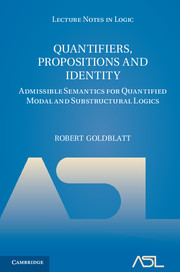 Quantifiers, Propositions and Identity
Quantifiers, Propositions and Identity Published online by Cambridge University Press: 07 September 2011
The main aim of this chapter is to set out a new kind of admissible model theory for the propositional relevant logic R and its quantified extension RQ. First we review the relational semantics for R of Routley and Meyer [1973], and its adaptation by Mares and Goldblatt [2006] to an admissible semantics for RQ. Then we introduce an alternative kind of structure, called a cover system, motivated by topological ideas about “local truth” from the Kripke-Joyal semantics for intuitionistic logic in topos theory. These are combined with a modelling of negation by a binary world-relation of orthogonality, or incompatibility, as in [Goldblatt 1974], and an operation of combination, or “fusion”, of worlds to interpret relevant implication. Characteristic model systems for R have an algebra Prop of admissible propositions, while those for RQ have a set PropFun of admissible propositional functions as well.
We then show that by conservatively adding an intuitionistic implication connective to R it is possible to characterise that logic by models in which all possible propositions are admissible. The prospects for a similar analysis of RQ are considered at the end.
Routley-Meyer Models for R
The subject of relevant logic (also known as relevance logic) is based on the view that an implication A → B can only be true if the meaning of A is relevant to the meaning of B.
To save this book to your Kindle, first ensure [email protected] is added to your Approved Personal Document E-mail List under your Personal Document Settings on the Manage Your Content and Devices page of your Amazon account. Then enter the ‘name’ part of your Kindle email address below. Find out more about saving to your Kindle.
Note you can select to save to either the @free.kindle.com or @kindle.com variations. ‘@free.kindle.com’ emails are free but can only be saved to your device when it is connected to wi-fi. ‘@kindle.com’ emails can be delivered even when you are not connected to wi-fi, but note that service fees apply.
Find out more about the Kindle Personal Document Service.
To save content items to your account, please confirm that you agree to abide by our usage policies. If this is the first time you use this feature, you will be asked to authorise Cambridge Core to connect with your account. Find out more about saving content to Dropbox.
To save content items to your account, please confirm that you agree to abide by our usage policies. If this is the first time you use this feature, you will be asked to authorise Cambridge Core to connect with your account. Find out more about saving content to Google Drive.